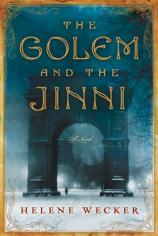Reading Group Guide
Discussion Questions
The Golem and the Jinni

1. Compare the Golem and the Jinni’s origins. How are their personalities reflected in their origins? How are the creatures similar, and how do those similarities draw them together? How are they different? What are their individual strengths—and what makes them weak? How do these influence their choices as events unfold? How do the Golem and the Jinni make each other better beings?
2. What are Chava and Ahmad like when we first meet them? What about at the end of the story? How do events impact who they are and what they believe about themselves and each other?
3. Why do you think Helene Wecker chose to set the story in turn-of-the-century New York? How do the experiences of the Golem and the Jinni mirror those of their fellow immigrants? Are their magical powers all that set them apart from their human neighbors? How might the story unfold if it were set today? What would Ahmad and Chava think about modern America? Would it be easier or more difficult for them to adapt and blend in to contemporary urban society?
4. What do we learn about life—about what it means to be human—from Ahmad and Chava? How does each reflect particular aspects of the human character, both our noble inclinations and our flaws?
5. What is your opinion of the characters, the Golem and the Jinni? What do you like best about each of them? If you could have a magical power, what would it be?
6. Describe the Jinni’s relationship with the tinsmith who released him, Arbeely. Why does he keep the Jinni’s secret? What about the relationship between the Golem and Rabbi Meyer? Why doesn’t he destroy her?
7. Numerous secondary characters are central to the Golem and the Jinni’s story: Saleh, Maryam, Anna, Matthew, Sophia, Michael. Choose one or two of them, and show their role in the story and in the lives of Chava and Ahmad. For instance, think about Sophia’s love affair with Ahmad and Michael’s relationship to Chava. How are these humans transformed by their involvement with these supernatural beings? How is Saleh connected to Ahmad? What do we learn about Ahmad from his interactions with young Matthew?
8. Early in the novel Rabbi Meyer and his nephew, Michael, are having a philosophical discussion about faith, tradition, and modernity. Michael tells him, “As long as we keep to our old beliefs, we’ll never find our place in the modern world.” His uncle replies, “Of course, this wonderful modern world that has rid us of all ills, of poverty and corruption! What fools we are, not to cast our shackles aside!” Do you agree with Michael? How can we keep our traditions and faith while still embracing change? How is this struggle reflected in both Chava and Ahmad’s characters?
9. What is Yehuda Schaalman’s role in the story? What drives him? What lessons can we learn from his experiences? What does he want from Chava and Ahmad? Towards the end of the novel, Chava and Ahmad discuss Schaalman’s character and the choices he has made. Are we slaves to our natures? Can we change them?
10. What parallels do you see in this story set a century ago and our own lives today? What elements make the story historical and what makes it modern? What do you think will happen to Chava and Ahmad?
The Golem and the Jinni
- Publication Date: April 23, 2013
- Genres: Fantasy, Fiction, Historical Fantasy, Historical Fiction
- Hardcover: 496 pages
- Publisher: Harper
- ISBN-10: 0062110837
- ISBN-13: 9780062110831







